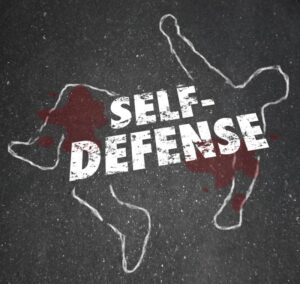A topic that frequently arises in the course of criminal defense is pointing a firearm a criminal charge from doing so on one’s own property. Many litigants are surprised to learn that the curtilage and standing one’s ground under the castle doctrine does not automatically authorize pointing a firearm at someone who enters your property where your home is located. This is the topic of this blog post.
Pointing a firearm at someone on your property is a first step toward the exercise of deadly force. The castle doctrine provides an affirmative defense (this means you can legally do what is otherwise illegal, namely point a firearm) to certain uses of force as codified in the penal code, which states:
“A person is justified in using reasonable force, including deadly force, against any other person; and does not have a duty to retreat; if the person reasonably believes that the force is necessary to prevent or terminate the other person’s unlawful entry of or attack on the person’s dwelling, curtilage, or occupied motor vehicle.”1
The curtilage is generally synonymous with your yard, but they are not always the same; curtilage is likely to be given a narrow legal meaning in a deadly force case to point a firearm and mean the land immediately surrounding your home. The key word in this affirmative defense is “reasonable force.” Thus, if someone occasions up your yard and throws trash onto it, yells at you, or otherwise acts in a similar way, the force under the castle doctrine is limited to reasonable force.
This brings up the unwritten legal concept known as proportionality. What this means is “reasonable force” is enough to rebut the force being applied. A mere trespass, while one may stand his or her ground, does not allow deadly force to be applied because it is not reasonable as it is not proportional. It may allow escorting the trespasser off.
However, this does not mean that a person standing his ground is left to guess either. If an aggressor comes with any type of deadly weapon, this may be sufficient to stand one’s ground, point a firearm, and use it, and have a complete defense because of the attack on the person’s curtilage. Again, civil suit is likely so avoiding any deadly force encounter possible is the wise choice. Inside the home is clearer as to someone breaking in and deadly force or significant force being exercised.
The legal concept and take-away from this blog is activity occurring outside the house is a grey legal area and it may not be wise to stand one’s ground; in any event, use of force outside must be reasonable, which generally means proportional. Someone yelling at you on your property, littering, trespassing, or the like, in most cases does not allow for the pointing of a firearm or discharge unless serious bodily injury or death is likely to result from the transgression.
This blog post is written by attorneys at Dixon & Moseley, P.C. who handle firearms and criminal defense cases across the State, including deadly force cases and those offenses that come from firearms, such as pointing a firearm, discharge into an occupied structure and intimidation. This blog is for general informational purposes and is not intended as legal advice or a solicitation for legal representation. It is an advertisement.






